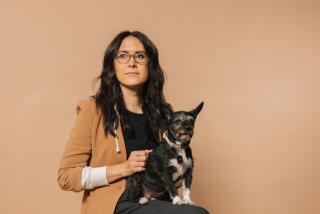‘Cybergoddess’ Plans to Expand Electronic Domain : Computers: Conferences--live and on-line--are a popular part of New York woman’s small service. She hopes to have a network.
- Share via
NEW YORK — The Queen of Cyberspace plans to expand her domain to a city near you.
Stacy Horn runs Echo, the hip New York on-line computer service, out of her small apartment in New York’s Greenwich Village, where computer equipment shares space with rubber figures of Godzilla, a rat and others.
Echo’s own computers provide an electronic salon where members gather via their own computers and phone lines to discuss a dizzying variety of topics.
Horn wants to set up locally run and locally flavored Echo offshoots in Boston, Los Angeles, New Orleans, Seattle, Minneapolis and Miami, along with interactive television programs.
At 3,500 members, Echo is tiny compared with such on-line giants as CompuServe, America Online and Prodigy, whose memberships top 1 million each.
But its New York feel and reputation as a relatively friendly place for women have drawn attention from Newsweek, Rolling Stone, the New Yorker and other magazines. The media have dubbed Horn “Cybergoddess” and “Queen of Cyberspace.”
Echo members include luminaries such as feminist author Susan Brownmiller, New Yorker magazine television critic James Wolcott and, briefly, John Kennedy Jr.
Echoids or Echoistes, as they call themselves, don on-line pseudonyms like “Garbled Uplink” and “Neandergal” and communicate through electronic mail.
One of Echo’s most entertaining features is its conferences, devoted to particular topics.
The service’s 50 to 60 conferences have titles such as “Culture,” “Sex,” “New York” and “Food.” There are conferences devoted to New York institutions such as the Village Voice weekly newspaper and the Whitney Museum.
The conferences are divided into discussion headings, such as “Does God Have a Sense of Humor?”
But for Horn, a sense of community--in the real world as well as on-line--is Echo’s most important aspect.
She recalled how a young hacker once known as Phiber Optik--real name Mark Abene--began helping with Echo’s technical aspects but said he didn’t want to get involved with Echoids. Despite himself, he did, meeting a woman known on-line as Cafephreak who is now his fiancee.
When Abene ran afoul of the law, drawing a one-year prison sentence for unauthorized computer access, Echoistes threw him a lavish going-away party.
“It made me cry,” Horn said.
Echoistes get together every two weeks at Greenwich Village’s Art Bar. Some also meet for softball, bowling or poker at Brownmiller’s apartment.
“It’s that face-to-face element, I think, that’s really strengthened the electronic community,” Horn said. “There are all sorts of problems with communication on-line because you can’t see the person.”
Horn has worked to make Echo a friendly place for women, who make up 38% of its membership, higher than some of the larger services like CompuServe, whose membership is 8% female. America Online says 30 percent of its customers are female while Prodigy has 38%. All say they want more women on-line.
Horn hastens to add that her service is for all kinds of people. “You need more variety. . . . I wanted more women on-line just because I thought it would make Echo cooler.”
Horn developed Echo with 20 friends, opening it in March, 1990. But only in the past year or so has it taken off, with membership growing 10-15% a month. “It’s incredible,” she said.
She hopes to have the Echo offshoots--which will pick their own names--up and running in early 1996 and all hooked up to the original service in an “Echo Network.”
“You live where you want to live because that’s where you’re most comfortable, but you want to visit other places,” she said. “Unlike the other systems that are trying to break down all these geographical and cultural boundaries, I’m trying to strengthen them, because what’s the sense of visiting these other places if they’re not different?
“We’re going to spend a couple of months researching each city,” then meet with the most promising-sounding groups of people there, she said. “We’ll help them find the space, set up the equipment.
“And then from there, they will run it. We will just provide advice, guidance, support, whatever they need, but it’s theirs. As they prove their success, then they can start buying (shares in) it. It’ll still be a corporation but it’ll be more of a partnership,” Horn said.
Horn is seeking capital but hasn’t found the perfect source yet. “I want somebody who’s in love with this whole thing . . . and (who can) bring expertise that I don’t have.”
As with Echo, she plans to own the majority stake in the offshoots. “But if it works out, they’ll be rich. And I’m not greedy. In fact, I pretty much have all the money I want.”






